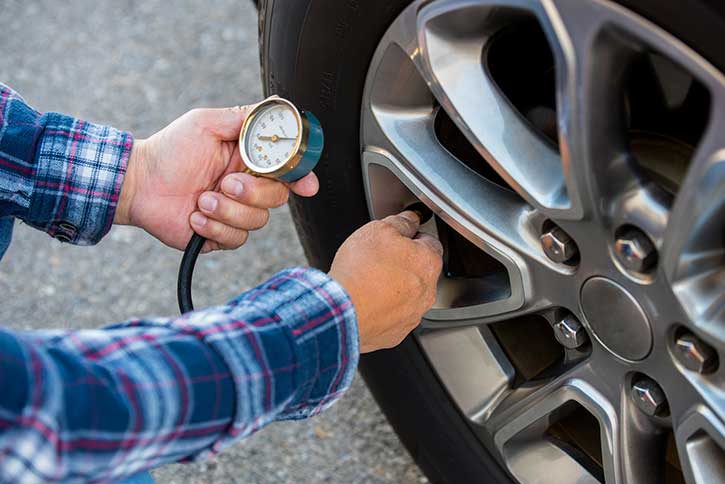 These tire safety tips can give you a smoother ride, better gas mileage and help you stay safe on the road.
These tire safety tips can give you a smoother ride, better gas mileage and help you stay safe on the road.
Check Tire Pressure Once a Month
It is vital to check your tire pressure at least once a month and before you embark on any long trip. Due to fluctuations in temperature and other factors, most tires naturally lose air over time. According to the National Highway Traffic Safety Administration (NHTSA), under-inflation is a leading cause of tire failure and tire-related car accidents. Keeping your tires inflated at the proper PSI also improves vehicle handling, gas mileage, and will lengthen the life of your tires.
Invest in a tire pressure gauge and keep it in your car. Recommended tire pressures are located on a label on the driver’s door frame, glove compartment or in your vehicle’s owner’s manual. NEVER over-inflate your tires. This will make them more prone to popping and put you and others at risk.
Inspect Tires Regularly
Visually inspect your tires when you’re checking tire pressure. Irregularities to look for include:
- Uneven or excessive tread wear
- Separation of tread
- Cracks or bulges anywhere on the tire
- Punctures or foreign objects embedded in the tire
If you see any of these anomalies, take your car to be checked out as soon as possible.
Rotate Tires Periodically
A good rule of thumb is to rotate your tires every 6,000 miles. Periodic tire rotation helps tread wear evenly and your tires will last longer. When you take your car in for an oil change, ask technicians to rotate your tires. This service is often free or included in the price of an oil change.
Maintain Proper Tire Balance
Tires that are out of balance can cause excessive wear on the suspension and other components of your vehicle. Severe thumping, which is usually most noticeable at higher speeds, can indicate that your tires are out of balance and need to be adjusted.
Maintain Proper Steering and Suspension Alignment
Misaligned steering and suspension not only affects the stability and feel of a vehicle; it may cause fast, uneven tire wear and can ruin a tire in a short period of time. If you find your steering wheel “pulling” in one direction when traveling on a straight, flat road, have the alignment checked as soon as you can.
Replace Tires When Needed
Replace your tires if the tread is extremely worn or uneven, sidewalls are bulged or cracked, or if the tire has been punctured and cannot be properly repaired. If you’ve been using winter tires, change them in the spring.
Tires should be the same size, brand and type; and installed in pairs or complete sets. Make sure to choose tires that are appropriate for your needs and your vehicle. Reliable, well-constructed “all-season” tires work well for most types of vehicles.
What to Do If You Have a Blowout
If your tire blows, try to keep the steering wheel straight and continue in the same direction you were traveling, no matter how hard your car tries to pull to one side. This will keep the car stable, since the area where the tire blew is now a few inches lower to the ground.
Your car may decelerate rapidly, almost as if you have slammed on the brakes. It may sound counter-intuitive, but hit the gas hard enough to counter the deceleration caused by the tire blowout. Once the vehicle is stabilized, take your foot off the gas and continue driving straight. If you’re traveling at a high speed, you can now apply light pressure on the brake to get your speed under control. Slamming on the brakes or sharply turning the wheel before you come to a stop will upset the car’s balance, which could cause it to spin.
If it’s a rear tire that’s blown, gradually slow down even more before you work your way off the road. Ease your vehicle onto the shoulder and make sure you’re a safe distance from the road.
If You Are Involved in an Accident
Following these tire safety tips can help you avoid accidents and stay safe but anything can happen on the road. If you have been injured in a motor vehicle accident, our experienced personal injury attorneys in the Lehigh Valley can help. To schedule a free consultation, contact Thomas, Conrad & Conrad today.

